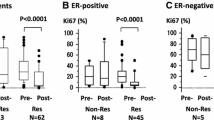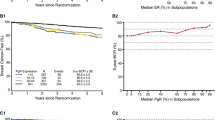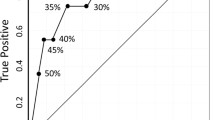Abstract
Oestrogen receptor (ER) negative breast cancers are more likely to achieve a pathological complete response (pCR) to neoadjuvant chemotherapy compared to those with ER positive tumours. ER positive tumours exhibit low proliferation and ER negative cancers high proliferation. The aim of this study was to determine to what extent the better response of ER negative cancers correlates with proliferation rate. A retrospective analysis of a prospectively maintained database identified 175 neoadjuvant chemotherapy patients with tissue available for Ki67 analysis. On univariate analysis, pre-therapy Ki67 (P = 0.04), ER status (P = 0.002), HER2 status (P = 0.004) and grade (P = 0.0009) were associated with a pCR. In a multivariate model, HER2 was the only significant predictor of pCR. No significant relationship between pre-therapy Ki67 and relapse-free and overall survival was demonstrated. Ki67 is not an independent predictor of clinical CR or pCR. Aspects of ER status beyond its inverse relationship with proliferation may contribute to its predictive value for pCR.
Similar content being viewed by others
References
Jones RL, Smith IE (2006) Neoadjuvant treatment for early-stage breast cancer: opportunities to assess tumour response. Lancet Oncol 7:869–874. doi:10.1016/S1470-2045(06)70906-8
Colleoni M, Viale G, Zahrieh D et al (2004) Chemotherapy is more effective in patients with breast cancer not expressing steroid hormone receptors: a study of preoperative treatment. Clin Cancer Res 10:6622–6628. doi:10.1158/1078-0432.CCR-04-0380
Pohl G, Rudas M, Taucher S et al (2003) Expression of cell cycle regulatory proteins in breast carcinomas before and after preoperative chemotherapy. Breast Cancer Res Treat 78:97–103. doi:10.1023/A:1022165715043
Ring AE, Smith IE, Ashley S, Fulford LG, Lakhani SR (2004) Oestrogen receptor status, pathological complete response and prognosis in patients receiving neoadjuvant chemotherapy for early breast cancer. Br J Cancer 91:2012–2017. doi:10.1038/sj.bjc.6602235
Parton M, Krajewski S, Smith I et al (2002) Coordinate expression of apoptosis-associated proteins in human breast cancer before and during chemotherapy. Clin Cancer Res 8:2100–2108
Ravaioli A, Bagli L, Zucchini A, Monti F (1998) Prognosis and prediction of response in breast cancer: the current role of the main biological markers. Cell Prolif 31:113–126. doi:10.1111/j.1365-2184.1998.tb01190.x
Archer CD, Parton M, Smith IE et al (2003) Early changes in apoptosis and proliferation following primary chemotherapy for breast cancer. Br J Cancer 89:1035–1041. doi:10.1038/sj.bjc.6601173
Carey LA, Dees EC, Sawyer L et al (2007) The triple negative paradox: primary tumour chemosensitivity of breast cancer subtypes. Clin Cancer Res 13:2329–2334. doi:10.1158/1078-0432.CCR-06-1109
Jones RL, Salter J, A’hern R et al (2008) The prognostic significance of Ki67 before and after neoadjuvant chemotherapy in breast cancer. Breast Cancer Res Treat. doi:10.1007/s10549-008-0081-7
Jones RL, Lakhani SR, Ring AE, Ashley S, Walsh G, Smith IE (2006) Pathological complete response and residual DCIS following neoadjuvant chemotherapy for breast carcinoma. Br J Cancer 94:358–362
Ellis P, Smith I, Ashley S et al (1998) Clinical prognostic and predictive factors for primary chemotherapy in operable breast cancer. J Clin Oncol 16:107–114
Elston CW, Ellis IO (1991) Pathological prognostic factors in breast cancer. I. The value of histological grade in breast cancer: experience from a large study with long-term follow-up. Histopathology 19:403–410. doi:10.1111/j.1365-2559.1991.tb00229.x
Harvey JM, Clark GM, Osborne CK, Allred DC (1999) Estrogen receptor status by immunohistochemistry is superior to the ligand-binding assay for predicting response to adjuvant endocrine therapy in breast cancer. J Clin Oncol 17:1474–1481
Petit T, Wilt M, Velten M et al (2004) Comparative value of tumour grade, hormonal receptors, Ki-67, HER-2 and topoisomerase II alpha status as predictive markers in breast cancer patients treated with neoadjuvant anthracycline-based chemotherapy. Eur J Cancer 40:205–211. doi:10.1016/S0959-8049(03)00675-0
Penault-Llorca F, Cayre A, Bouchet Mishellany F et al (2003) Induction chemotherapy for breast carcinoma: predictive markers and relation with outcome. Int J Oncol 22:1319–1325
Tinari N, Lattanzio R, Natoli C et al (2006) Changes of topoisomerase II alpha expression in breast tumours after neoadjuvant chemotherapy predicts relapse-free survival. Clin Cancer Res 12:1501–1506. doi:10.1158/1078-0432.CCR-05-0978
Arriola E, Rodriguez-Pinilla SM, Lambros MB et al (2007) Topoisomerase II alpha amplification may predict benefit from adjuvant anthracycline in HER2 positive early breast cancer. Breast Cancer Res Treat 106:181–189. doi:10.1007/s10549-006-9492-5
Bottini A, Berruti A, Brizzi MP et al (2005) Cytotoxic and antiproliferative activity of the single agent epirubicin versus epirubicin plus tamoxifen as primary chemotherapy in human breast cancer: a single-institution phase III trial. Endocr Relat Cancer 12:383–392. doi:10.1677/erc.1.00945
Faneyte IF, Schrama JG, Peterse JL, Remijnse PL, Rodenhuis S, van de Vijver MJ (2003) Breast cancer response to neoadjuvant chemotherapy: predictive markers and relation with outcome. Br J Cancer 88:406–412. doi:10.1038/sj.bjc.6600749
Prisack HB, Karreman C, Modlich O et al (2005) Predictive biological markers for response of invasive breast cancer to anthracycline/cyclophosphamide-based primary (radio-)chemotherapy. Anticancer Res 25:4615–4621
Liedtke C, Mazouni C, Hess KR et al (2008) Response to neoadjuvant therapy and long-term survival in patients with triple-negative breast cancer. J Clin Oncol 26(8):1275–1281. doi:10.1200/JCO.2007.14.4147
Rouzier R, Perou CM, Symmans WF et al (2005) Breast cancer molecular subtypes respond differently to preoperative chemotherapy. Clin Cancer Res 11(16):5678–5685. doi:10.1158/1078-0432.CCR-04-2421
Takada M, Kataoka A, Toi M et al (2004) A close association between alteration in growth kinetics by neoadjuvant chemotherapy and survival outcome in primary breast cancer. Int J Oncol 25:397–405
Lee J, Im YH, Lee SH et al (2008) Evaluation of ER and Ki-67 proliferation index as prognostic factors for survival following neoadjuvant chemotherapy with doxorubicin/docetaxel for locally advanced breast cancer. Cancer Chemother Pharmacol 61:569–577. doi:10.1007/s00280-007-0506-8
Vincent-Salomon A, Rousseau A, Jouve M et al (2004) Proliferation markers predictive of the pathological response and disease outcome of patients with breast carcinomas treated by anthracycline-based preoperative chemotherapy. Eur J Cancer 40:1502–1508. doi:10.1016/j.ejca.2004.03.014
Honkoop AH, van Diest PJ, de Jong JS et al (1998) Prognostic role of clinical, pathological and biological characteristics in patients with locally advanced breast cancer. Br J Cancer 77:621–626
Bonnefoi H, Diebold-Berger S, Therasse P et al (2003) Locally advanced/inflammatory breast cancers treated with intensive epirubicin-based neoadjuvant chemotherapy: are there molecular markers in the primary tumour that predict for 5-year clinical outcome? Ann Oncol 14:406–413. doi:10.1093/annonc/mdg108
de Azambuja E, Cardoso F, de Castro G Jr et al (2007) Ki-67 as prognostic marker in early breast cancer: a meta-analysis of published studies involving 12, 155 patients. Br J Cancer 96(10):1504–1513. doi:10.1038/sj.bjc.6603756
Acknowledgment
This work was supported by the Cridlan Charity Fund.
Author information
Authors and Affiliations
Corresponding author
Rights and permissions
About this article
Cite this article
Jones, R.L., Salter, J., A’Hern, R. et al. Relationship between oestrogen receptor status and proliferation in predicting response and long-term outcome to neoadjuvant chemotherapy for breast cancer. Breast Cancer Res Treat 119, 315–323 (2010). https://doi.org/10.1007/s10549-009-0329-x
Received:
Accepted:
Published:
Issue Date:
DOI: https://doi.org/10.1007/s10549-009-0329-x




